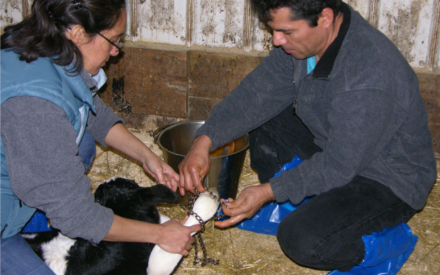English | Spanish
Culture
Culture—whether of an individual or an organization—is an important but often challenging concept to grasp. It is intangible, making it difficult to identify examples in real life. Most people focus on what’s visible: a person who is a different color, sex, speaks a different language, or dresses differently. These are some of the easier signs of cultural identity to identify, but they don’t necessarily get at the core of what makes that person who they are.
How does culture apply to farm business?
The farm culture represents “the way things get done around here” and it can be positive or present a challenge for employees. No two farms are alike because the people who make up the farm team are unique! People bring with them a myriad of experiences and cultural identities to their workplace. Farms are no different as owners, managers, and employees contribute to the farm’s culture.
The culture on a farm may not be obvious or visible, but it is there. It is often overlooked in employee management but can be reflected, for example, in the level of attention put on safety, animal welfare, or type of working environment (relax/collegial vs uptight/stressful). Farm culture affects the day-to-day operation of the farm and the relationship between manager and employee. Farm culture core values may be reflected in long-term or day-to-day decision such as, “investing in the latest technology in order to maintain efficiency”, or “if it isn’t broke, don’t fix it”.
Recognizing the Farm Culture
When we talk about farm business culture, we are not referring to the enterprise or type of production of the farm. Farm business culture relates to the values, goals, beliefs, and way things are done on the farm – communication, how work is accomplished, how achievements are celebrated, etc.
The farm culture is important because:
- The farm business culture affects every aspect of the farming operation.
- The culture of the farm determines the path the farm takes, as well as the farm’s path towards their goals or the vision.
- Culture must be learned, and it is taught, therefore it is the responsibility of the manager/owner to lead by example.
- The culture is behind the work and provides the context for the work done on the farm
The University of Wisconsin-Division of Extension through the Farm Management Program created “Becoming the Employer of Choice” program where you can find educational material related to Farm Business Culture. Objectives of that program are:
- To understand and define the concept of culture.
- To appreciate the role of culture on the farm.
- To gain awareness of employees’ cultures and how they bring culture to the job.
- To learn about organizational culture and how it affects employee motivation and engagement.
- To identify positive business cultural characteristics and how to develop these on the farm

 Understanding the Total Compensation Statement Benefits Everyone
Understanding the Total Compensation Statement Benefits Everyone Large Language Models: A Powerful New Tool for Wisconsin Agriculture
Large Language Models: A Powerful New Tool for Wisconsin Agriculture There’s Opportunity in Those “Near Misses” on Your Farm
There’s Opportunity in Those “Near Misses” on Your Farm  Building a Positive Farm Business Culture: Characteristics of Latin/Hispanic dairy workers
Building a Positive Farm Business Culture: Characteristics of Latin/Hispanic dairy workers


